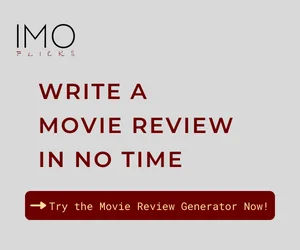How To Write A Movie Review Effortlessly | 10 Easy Steps
Want to learn how to write a movie review? Well, it really doesn’t have to be a daunting process. Movie reviews can be a lot of fun when approached correctly. This article is going to provide you with several tips and tools to make creating your very own movie review as seamless as possible.
After having read several academic articles online, books by professional film critics, and videos from writing professionals on YouTube, I noticed that a lot of the advice on how to write a movie review overlaps but also includes vague steps and unnecessary additions.
Although there is no “right” way to write a movie review, my 3+ years of experience crafting movie reviews online have taught me to identify the more essential elements of a movie review from the areas where I can have fun and be more creative in how I approach a review.
The following article is going to draw from all the knowledge obtained on movie reviews and simplify it, breaking down what is and actually isn’t necessary for a stellar movie review. With a streamlined step-by-step process, you will be left with a solid foundation on how to write a movie review and have an awesome review written in no time.
How to Write a Movie Review | 10 Steps

After scouring the internet and finding advice from universities, film schools, and the like, one thing they all have in common is to:
1) Watch the Movie (you don’t NEED to watch it twice) & Take Notes
There is no movie review without watching the movie first. This is a non-negotiable step.
But — a negotiable step is watching the movie a second time.
A lot of sources recommend that you watch the movie twice, sometimes even more than that. Depending on the movie that you’re watching and the depth of the movie review this is not always necessary.
If you’re doing a film analysis where you’re deriving meaning from details within the film, a second watch may help you further extract meaning and notice details you may have missed on the first go-round.
However, some movies are more casual and don’t require further analysis. Especially given that movies tend to take up to 2 hours (or even more), it may be a better use of your time to draft your movie review first before deciding if you need another viewing.
If you’re having a hard time expounding on what to write in the movie review, then another watch can give you some more material to work with but otherwise, don’t waste your valuable time. Not every movie is worth a second watch.
It’s even better if you’re able to stream the movie because then you can just jump to the moments that caught your attention rather than having to rewatch the whole film.
How to Take Good Notes
I am a big fan of writing physical notes.
Physically taking notes with pen and paper is scientifically proven to enhance your ability to remember important details.
Mental notes alone are not reliable and good physical notes will aid you greatly when you’re not sure what to say about a film.
I would argue that if you take good notes while watching the movie then you will most likely not need to watch it twice.
Whatever sticks out to you, jot it down real quick. If there is a scene you’d like to revisit, jot down the timestamp to make re-evaluation seamless.
Any pertinent quotes, standout camera shots, super lovable/unlovable characters, funny thoughts you have during the film that you don’t want to forget, or anything notable that crosses your mind, WRITE IT DOWN.
Taking quick notes while you watch can easily help to jolt your memory when trying to pick out important things to write about.


This notebook is my go-to for taking notes when I watch movies on streaming services. It lays perfectly flat and has plenty of space for more detailed descriptions.
Your Turn
If you have yet to watch the movie, find a notebook that you can take notes in and a good pen for note-taking. Watch the movie and take notes as you watch.
If you have already watched the movie and still have details fresh enough in your mind, find a notebook and a pen and jot down everything in the movie that stood out to you.
2. Identify Your Audience
This is another common step among the internet advice on how to write a movie review and it’s important to consider.
Determining who you’re writing for is going to set the foundation for how you write and what you choose to write about in your movie review.
If you’re writing a movie review for school, then your audience is the teacher that will be grading your assignment.
Depending on the assignment, your teacher may have a rubric of requirements that they expect from you. And because the review is academic, you will want to write with exceptional grammar, a professional tone, and display a level of expertise in the area of education that your teacher is targeting.
Your teacher may require you to discuss the climactic points of the movie, meaning that there would be no need to avoid spoilers.
On another hand, a classic movie review, one that might be featured in an online publication, is primarily for the point of promoting a film. The purpose of these public reviews is often to make readers aware of the movie and to make readers curious about the movie as well.
With a movie review structured for the general public, you will want to make sure that your review always has a synopsis, explaining what the film is about, doesn’t contain any information that may spoil the movie for viewers, and is easy to comprehend given the average person’s reading comprehension is at a 7-8th grade level.
You have to consider what your audience is looking for and what they need to best know how to focus your review.
Your Turn
In the same notebook that you used to jot down your notes on the movie you’re reviewing, write down who your audience is.
Answer this question: Who will benefit from reading this review?
Some answers I often have, as an opinionated movie reviewer is: People who share the same sentiment on a film and want to commiserate, people who are wondering if a film is worth their time, people who want post-movie discussion…
Then answer this question: What information is my audience looking for?
If your movie review is academic pull up a copy of your rubric, and print it out if possible so that you are reminded of what your audience is looking for.
If you’re writing for the general public, note down the information you want then to leave your review with.
Example: I want them to leave with a better understanding of what the film is about, knowing whether the film is good or not, have a better understanding of the confusing themes of the film, and leave knowing whether the film is worth their time.
3) Craft An Introduction
The first sentence is your bait to catch the reader’s attention.
Now that you’re aware of who you’re writing for, you can best determine what would be an appropriate way to get this person’s attention.
This doesn’t have to be extravagant, super witty, or clickbaity. People who are reading are already somewhat interested in the movie itself so you can immediately jump into what makes the movie interesting, good, or bad.
In my study of movie reviews, I noticed a few common ways that movie reviewers often start off their reviews and gathered some examples from critically acclaimed film critic, Roger Ebert’s website to display some effective methods with which to open your movie review.
Movie reviews can start with a personal anecdote.
- “I was reminded of a recording made in the 1980s by the Dadaist sample-based music group Negativland, in which they bemoaned: ‘Is there any escape from noise?'”(Tar Movie Review )
They can get right to the point and immediately narrate the film’s plot.
- “June and Jennifer Gibbons were Welsh twins born to Caribbean immigrants in the 1960s.” (The Silent Twins Movie Review)
They can start storytelling with a separate narrative that segways into the film’s story.
- “When they were leaving the world premiere of G. W. Pabst’s film “Pandora’s Box” (1928), Louise Brooks could hear her name in the crowd around her, but she didn’t like the tone they were using.” (Diary of a Lost Girl Movie Review)
They can start by setting the scene.
- “Every lamp and ladylike cocktail dress, every convertible and clink of a martini glass is a perfect reflection of retro chic in Olivia Wilde’s ‘Don’t Worry Darling.'” (Don’t Worry Darling Movie Review)
They can start with noting the cultural significance of the movie, addressing the elephant in the room.
- “Bros,” co-written by and starring Billy Eichner, has been touted as the first mainstream Hollywood studio-backed rom-com to feature gay men as the leads.” (Bros Movie Review)
Or they can start with a bold statement, dropping a hot take that needs further explanation.
- “Sometimes I look at Harry Styles and I feel bad for him.” (My Policeman Movie Review)
The rest of your introduction, which doesn’t need to be more than a paragraph long, should convey your general sentiments about the film.
By the end of the paragraph, readers should know just what kind of review they’re getting themselves into.
Hint at your praises and grievances with the film and then use the rest of the review to explain yourself.
Your Turn
In a fresh Word document, brainstorm some introductory sentences for your review. Remember to keep your audience in mind.
Don’t stress over getting anything perfect just yet, just get a few ideas on the paper using some of the examples above and then you can revisit your ideas later with a fresh mind.
4) Write a Brief Synopsis in Your Own Words
You don’t need more than 3 sentences to summarize the gist of the movie’s plot and I always try to fit it into one.
It’s important to include a synopsis because you don’t want to assume that your audience knows the movie as well as you do.
The reason they’re reading your writing is because you have information that they don’t have yet and are curious about.
So give them a brief foundation so that they can follow your train of thought for the rest of the review rather than being confused about what the movie is about the whole time.
Oftentimes, movie reviews like to weave in the synopsis with their opinions on the film, retelling the movie’s plot through their point of view. This is an acceptable substitute for a 1-3 sentence quick summary of the film.
However, if you want to focus on themes, scenes, or other details of the movie, be sure to include a unique synopsis before delving into a deeper analysis of the film.
Again, if your audience hasn’t seen the movie yet, DON’T INCLUDE SPOILERS. If you do include spoilers, give a disclaimer at the beginning of your review to warn readers ahead of time.
Your Turn
In your online document, summarize the movie in your own words within 1-3 sentences.
Be sure to include details that will intrigue readers but not spoil the movie for them.
5) Evaluate the Movie
What does it mean to evaluate the movie?
Before it gets intimidating, this is actually quite an easy step. And what I say may sound a bit controversial or simplistic but believe me, it works, especially for online reviews.
First, categorize the film into one of the three most BASIC categories of criticism: good, average, or bad.
Is the movie good, average, or bad?
Everything else in your review just expounds on just how good, average, or bad the film is and why. That’s all. This is your foundation.
Let’s say it’s a good film, we can then further analyze how the camera angles, the sublime messaging, and the subtle portrayal of bold emotions makes the film a distinguishably high level of good. We can then move on to more descriptive adjectives to describe the film like:
Exceptional, fine-tuned, daring, compelling, brilliant, unhinged, etc…
The evaluation is the body of your review.
If you’re writing a movie review for a class or an assignment, you may already have a rubric to adhere to, like centering your review on the acting or analyzing the deeper thematic modes of a pertinent scene.
If the focus of your review is less strict, I would recommend choosing 3 main aspects of the movie that provide evidence for why the movie is good, bad, or average.
Your Turn
In your Word document write out the following:
- Did you like the movie? Why or why not?
- This movie is … (good, average, or bad)
- List at least 3 main aspects of the film that make it either good, average, or bad.
- List some more definitive adjectives that identify just how good, average, or bad the film is.
- Given the category you placed the film in, what are aspects of the film that don’t fit that category (if any)? (AKA good parts of a bad film or vice versa)
- Rate the film out of 10 points, or out of 5 stars, whichever you’re more comfortable with.
6. Highlight Important Aspects of Analysis
Other articles on how to write a movie review mention highlighting the directors, cinematography, special effects, narrative structure, lighting, music, etc.
The reality of this is that the majority of people watching a film are not experts in the technical elements of constructing a film. And if you’re not an expert in any of these fields, then chances are your analysis of it will be surface-level.
Also, some movies are truly unremarkable in the technical aspects. Some movies have very generic plot structures. Some, you don’t even notice the music. So if nothing really stands out it’s nearly impossible and highly unnecessary to break down in detail every single minuscule aspect of the technicalities of creating a film.
Usually, 2 or 3 aspects of the technicality of a film will stick out to me as a non-cinematography expert.
For example, there might be some beautiful eye-striking camera moments that catch your eye. Or a certain track of the music that strikes an emotional chord. Not every single detail will be important to dissect, but what makes that movie stand out from the next movie is what is important to highlight in a movie review.
These aspects of the film often don’t need their own paragraph unless it is your main point of focus. You can often just slip in the director’s choices or the cinematographical choices within your general analysis of the film in a sentence or two.
Your Turn
Answer the following questions in your Word document:
- Did any of the director’s choices stand out to you?
- What do you think the movie’s intention was? Was it just to make you laugh? Was it to scare you? Was it to just make money?
- Is there anything notable among the actors?
- Is anything notable in the film’s soundtrack?
- Is anything notable in the lighting of the film?
- Is anything notable in the editing?
- Is anything notable in the set design?
- Is anything notable in the costuming?
- Is anything notable in the script?
- What was the movie trying to communicate? Did it have a pertinent message? Did it not have a message at all?
- Do any of the notable aspects of the film fall under the categories you listed above when mentioning why the film was bad, average, or good?
- If yes, include your analysis of these technical points under that paragraph of thought.
- If no, consider adding another paragraph solely for your technical observations.
7. Know the Actor’s Portfolios
A lot of movie reviews will include extra information on the actors and directors involved and advice on how to write a movie review often concurs with this idea BUT it’s not a vital addition to the movie review in my humble opinion.
If you’re writing for an audience that has not yet seen the movie, including the names of actors and directors involved in the movie can influence the reader to watch the movie so that is an upside to including the names. It also gives credit to whom credit is due.
However, providing extra information about the actors’ discography comes secondary to evaluating the actual world and people created within the movies themselves.
You can use additional information on the actors to determine how roles they played in the past may have contributed to or hindered their current performance but otherwise, keep the main focus on the movie at hand.
When creating movie reviews you do have to think about what your priorities are in terms of what you’re discussing.
Talking about too many aspects of the movie may lead to a movie review that drags on a bit too long, is unfocused, and is superfluous.
But you can also just quickly slip in a famous actor’s most popular work to give them credibility and to encourage people who liked their previous movie to check out their new movie.
(ie. Chris Evans (popular for his titular role as Captain America in Marvel movies) plays the main protagonist in this thrilling action film)
Honestly, parentheses are your friend when it comes to dropping knowledge on actors.
Your Turn
Go back to your synopsis of the film and place parentheses with the actor’s name who plays the character you’re mentioning.
When you first mention a character, place the actor’s name who played the character in parentheses.
If a particular actor stood out to you, or if you’re familiar with their work then write a sentence or two expanding on how their history as an actor contributed to their performance in the context of the current film.
8. Add a Conclusion
This is not recommended by everyone but I find that adding a conclusion is extremely helpful when writing a movie review, especially as the writer.
Again, not everyone does this but I find that it helps you to figure out what it is you’re really trying to say.
You take all of the observations that you made as well as your final sentiments towards the film and you determine why that evidence brings you to your final judgment of the movie.
People should be able to read just the conclusory paragraph and determine what your review is about.
Your conclusion should not be too long. A paragraph or two should suffice.
Your Turn
In your Word document write out the following:
- [name of the movie] is [good, average, or bad] because…
- Summarize your main arguments for why the film was good, average, or bad.
- Would you recommend this film to readers?
9. Study the professionals.
Right now, you have a messy draft of thoughts, ideas, and analyses on the movie but to construct it into a phenomenal movie review, you first have to know what a phenomenal movie review looks like.
If you go to the Pulitzer Prize website, they have archives of movie reviews written by professional film critics from large publications.
Reading these reviews helps to understand the structure, format, and mindset of film critics.
I read many of them and compiled them for my own personal research and one thing I learned is that a really good film review will make you want to watch a movie you’d never considered before.
They use a lot of adjectives and descriptive language to paint the image of the movie and give you a glimpse of what it’s like to be immersed in the movie yourself without giving the whole thing away.
They don’t shy away from inserting their own personal opinions and perspectives in their review but the movie is always the main character of the review.
I’ve gathered some of the best reviews that won Pulitzer Prizes and some reviews from top renowned film critics and organized them in the document here. Sign up to get it sent straight to your email.
Your Turn
Read up on some movie reviews online or sign up on the form above and I’ll send 50 of the best movie reviews to your inbox.
Note down some adjectives, descriptive words, phrases, or writing styles that the professionals use that you would like to emulate in your own review.
Revisit your Word document with your disjointed answered questions and flesh out your ideas to resemble professional writing styles you find to match the movie review you’re going for.
10. Edit Edit Edit
Editing is probably my favorite part because you already have all of the ingredients out and prepped, it’s just a matter of strategically combining them to make it as easily digestible for readers as possible. To mold it to the reader’s taste.
While editing, you may notice some details that you initially wrote down that don’t fit into your overall message. Knix it.
I’ll also say this, in studying the movie reviews of professionals, the average word count for their movie reviews was about 927 words.
Because of this, as someone who tends to over-write, I keep in mind to not be redundant in my speech. Say it powerfully, once, maybe reiterate if appropriate but no need to beat a dead horse.
You don’t need to repeat 6 times that the lighting was too dark. Make it clear that the dark lighting was an issue once or twice and that should suffice.
And you may also want to go through all the times that you repeated the same adjective (good, average, bad) and replace them with new adjectives or more descriptive phrases.
And if you’re underwriting, maybe find another detail within the movie that you can expand upon some more. If you liked or didn’t like something, make sure to theorize your reasoning for why you feel the way you do about the film.
Your Turn
Download an extension on your web browser that will read out the text of your document for you. I use Google Chrome and downloaded the Read Aloud Extension.
Listen to your review out loud and edit anything that doesn’t flow easily from one point to the next.
This type of editing gives your eyes a break and allows you to experience your review in a more natural way, encouraging a more seamless, easily comprehensible flow of your thoughts.
Keep in mind that you may have repeated the same words over and over. Go back to the times when you said the movie was good, bad, or average, and replace those areas with more creative language, descriptive terms, and such.
Additional Advice on How to Write A Movie Review
1. Write your review in the present tense
From the book, Five Stars! How to Become a Film Critic, the World’s Greatest Job, one piece of advice that really stuck with me was that you should write your movie reviews in the present tense.
This means that instead of saying, “This movie was good,” you would say, “This movie is good.”
At first, I ignored this advice because I didn’t understand why it was necessary to do this but after having written hundreds of reviews, it feels wrong to refer to a movie in past tense and I’m actively trying to change my ways now.
Here’s why it’s weird: when you speak about a movie in the past tense, it’s almost as if the movie died.
The reality is that the movie is in the past tense for the writer because they’ve already watched it, but for the reader, the movie is sometimes still unchartered territory. You should treat the movie as something still alive and still presently relevant.
The movie wasn’t good. It STILL IS good. So speak about it presently when appropriate.
2. Use compelling language, not just adjectives
Former film critic for the New York Times, A.O. Scott, emphasizes the importance of being creative with your language when writing movie reviews.
Tap back into those English classes where you learned similes, metaphors, and the like.
Also, there is no need to overdo it with the adjectives.
In studying outstanding movie reviews versus your average movie review, I found that reviews from top critics don’t actually use more adjectives than your average critic. But – they do use more unique adjectives, meaning that they have more variety in the adjectives that they do use.
Read reviews from some top critics here for some inspiration.
3. When in doubt, site someone else
This is a piece of advice from my experience on how to write a movie review.
Movie reviews are highly based on opinion. It’s difficult to be objective with art.
But considering that everyone receives and views art differently, it is helpful to consider the film from a different point of view.
When you are an opinionated person, you can tend to offend people. If you watch a movie that’s on a more culturally sensitive topic, you absolutely CANNOT skip the research.
Pull from factual, board-certified research journals, pull from well-established online publications, and pull from articles written by people who have a personal understanding of the controversial topic that’s being discussed.
There’s nothing worse than presenting an unfounded opinion as fact. Sometimes it’s best to take a neutral, observer point of view rather than insert your beliefs too deeply into the film analysis.
Also, if you have a hot take as an opinion, it’s smart to play devil’s advocate with yourself and show audiences that you understand a different point of view and have taken it into consideration.
You want the reader to understand that even if you don’t like the movie, it doesn’t mean that they might not enjoy the movie as well.
At the end of the day, the reader should have as much knowledge as possible to make the best decision for themselves, not feel like you’re trying to indoctrinate them with your beliefs.
Tools for Writing A Movie Review
The Guided Movie Review Generator
I kid you not, I use this tool on a good chunk of my reviews where there’s nothing particularly remarkable about the film to write about.
This movie review generator breaks down things to discuss in 3 stand-out moments or aspects of the film.
Just think of 3 things that set this film apart from other films and write about it.
It’s not perfect by any means but it gives a good foundation to fast-forward you to the “editing” portion of the movie review.
Try the Guided Movie Review Generator!
The AI Movie Review Generator
This generator can give you some ideas on some creative language that you can incorporate into your final review.
Try the AI Movie Review Generator!
In Conclusion…
Writing a movie review does not need to be hard, stressful, or overwhelming. Just follow these 10 steps on how to write a movie review and you will have all of the essential information you need to create a solid review.
Here are the 10 steps again:
- Watch the Movie (you don’t NEED to watch it twice) & Take Notes
- Identify Your Audience
- Craft An Introduction
- Write a Brief Synopsis in your own words
- Evaluate the Movie
- Highlight Important Aspects of Analysis
- Know the Actor’s Portfolios
- Add a Conclusion
- Study the professionals.
- Edit Edit Edit
Keep in mind that if you have the space to be more creative with your reviews, take it! One of my favorite reviews is Roger Ebert who disguised a review for the movie ET as an endearing letter to his grandchildren.
As long as what you’re doing is resonating with the audience and answers their questions easily and efficiently then you’re doing it right.
Hope I was able to explain how to write a movie review effortlessly and as helpfully as possible. Happy movie reviewing!
Do you have any questions on how to write a movie review? Let me know in the comments below!
And be sure to subscribe for the latest blog updates (form in sidebar).
Peace, love, and lots of popcorn,
IMO










